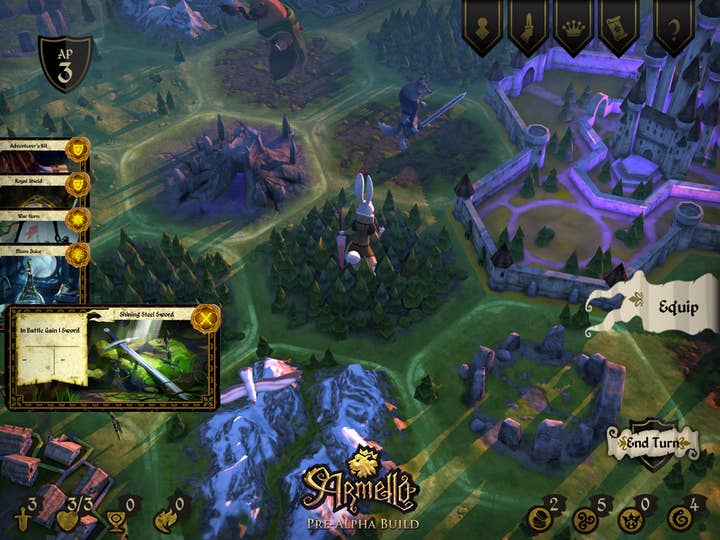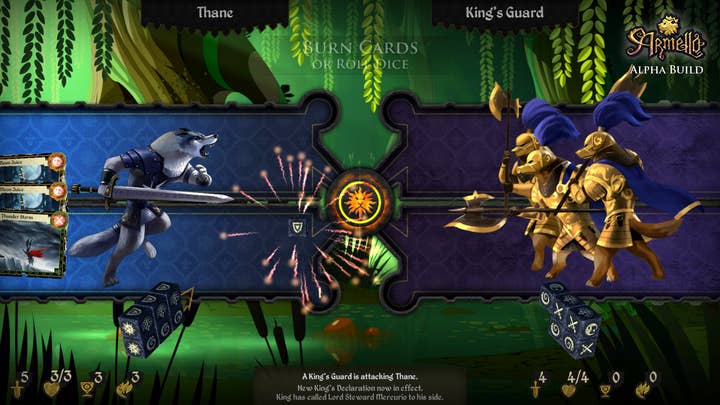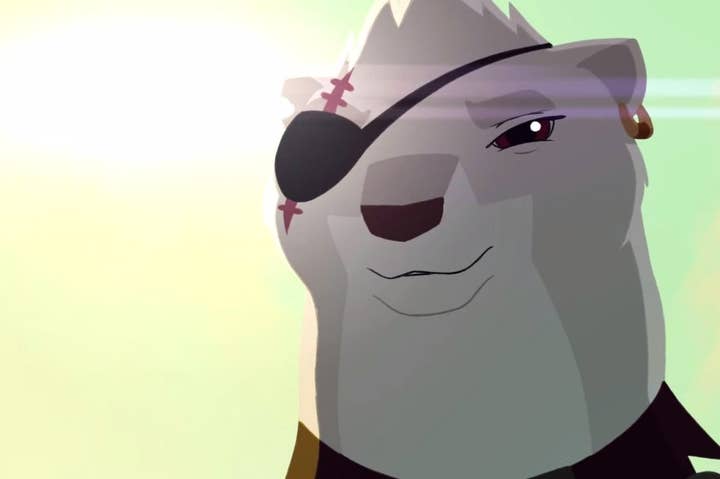Roll of the dice: Betting the future on board games
Australia's League of Geeks explains how it intends to shake up the board game landscape on iPad and Steam
The board games section of the App Store is a source of immense frustration to me. In it you'll find the usual timeless classics, your Monopoly, your Scrabble. There are a few cracking adaptations in there like Ticket to Ride or Small World, and some brilliant originals, such as Elder Signs and Lords of Waterdeep. But there's a lot of crap, too. Things that just shouldn't be there, things that aren't even tertiarily related to the genre.
I know. "The App Store's curation/discovery isn't brilliant, welcome to three years ago." I'm normally not even a stickler for precision nomenclature or categorisation. I don't know why, but it really winds me up.
I think it's at least in part down to the fact that tablets are such a perfect platform for board games. Complex, beautiful, in-depth board games, with automated rules that don't ruin everyone's Christmas with an argument based on pedantry and spite. Games which can be played together, in the same room or at a distance, over lazy Sundays or long rainy train journeys. I love board games, but I love the idea of being able to slip a dozen great board games into a coat pocket even more.
My frustration is shared by at least one other: League of Geeks' Trent Kusters. Unlike me, he's actually doing something about it, turning the skills of his Australia-based indie collective to the production of a beautifully rendered iOS and Steam board game in the shape of Armello: a slick mix of Narnian anthropomorphism, diplomacy, strategy and a surprisingly dark edge.
"You're thinking these guys are getting licenses for these huge games out of these great games that we love and they're just stuffing it up"
"We knew when we started the company that we wanted to collaborate with each other," he tells me, "and we wanted to pull other talented people from all around the world in on the project. We didn't know what that project was.
"While we went through a big process - myself and the other directors were figuring out what we wanted to do - all of us were playing board games on our iPad at the time. Like you said, the majority of the stuff on the store was just like random poker games or vaguely related games. The remaining games were just these absolutely, incredibly bad ports of existing board games.
"They just were offensively bad to a game developer, they were basically unacceptable. You're thinking these guys are getting licenses for these huge games out of these great games that we love and they're just stuffing it up. We didn't want to go and do that. This format of video games, especially now with having tablets around, it's just right to do certain video games, it's right to do board games well. It's ready and it's something that we feel we know inside out. We feel like we can do a really good job of it.
"So we said, 'Let's do it. Let's make a board game designed specifically for a digital platform,' basically. That's where it started and the next week Blake, one of the directors, came to the director's meeting and he brought the first paper prototype, which was like a satellite image from Google maps with a grid drawn up on it and pieces of paper and we started moving units around the board. We prototyped it on paper for about eight months, getting it right on paper. We didn't touch a line of code in that time. After that, once we felt like we had that perfect game, we dove into the code and started getting things happening and up on an iPad."

League of Geeks has been around for four years now, but Armello is its first game - a project that's been in progress for two and a half of those years. A successful Kickstarter aside, that's a long time to survive without funding, but Kusters says they'd had some help.
"We basically got a bit of funding and support from the local governments here. Australia in general used to have a really good games funding [program] that you may have. The Federal Games Fund was just recently axed. There's no Federal Games Funding anymore, but the state of Victoria that we're in, they're absolutely fantastic. The founding body here is Film Victoria, basically for all screen culture sort of stuff. They're just fantastic when it comes to games and they're true believers. You know, we have really ambitious dreams and hopes for Armello. Even since the start, we went in and basically pitched them this game that was going to be this huge international success and all we had behind us was some experience in some of the big studios around Australia and a whole heap of passion and talent that they knew about.
"They believed in us and they saw the promise in the project, so they were like, yeah, cool. We got a bit of funding from them, but the rest of it was completely funded by us, the Directors. There were five Directors for a while, now there's four. We all put in, we had to put a cash injection every month to keep the company afloat and cover a lot of the small running costs. If any large expenses come up, we put forward cash for that as well. Now we've sort of gone full time; that's thanks to Kickstarter."
Funding isn't the only blow that Australian development has taken. Two or three years ago, the local scene was undergoing the vicious winnowing process which was afflicting Europe and the US too. With less of a local support network of indies to soak it up, many thought that the blow would be fatal, but Kusters is confident that things are recovering.
"We all put in, we had to put a cash injection every month to keep the company afloat and cover a lot of the small running costs. If any large expenses come up, we put forward cash for that as well"
"It's without a doubt on the up and and up," he says, confidently. "I think it was maybe five years ago - so in 2009 - that the GFC happened. All these studios crumbled, 50 per cent of the major studios crumbled and the industry was out of work within a year or something like that. It was devastating. A few of us kicked off IGDA Melbourne so people had a place to go to at least in Victoria. They were like lost sheep...
"Then this indie thing happened and it became more apparent that a lot of them could just do that as opposed to leaving the industry. We know a lot of people that did. Then it takes time, that's just the beginnings. That's literally people needing each other and going, 'Hey, we could maybe get to work together and we could do this on our own.' There are some studios that started to come out and release some games that had some amount of success. It's only really now in the past year or so and this year that we're really seeing some stand out successes both culturally, critically and commercially come out of Australia."
The central concept of Armello is that the king, infested by a malaise known as the Rot, is slowly going mad. As his condition deteriorates, and his kingdom sickens, the environment becomes more hostile, the king less predictable. Players can choose to stay loyal to him, defending his will and opposing his usurpers, or slip into his castle themselves to assassinate him, avoiding layers of traps and loyal elite guards. Traps can also be laid for other players and the rapidly changing nature of the game's allegiances lend themselves well to some off-screen diplomacy.
It's also very beautiful, with story book art that looks like Wind in the Willows with a Quentin Blake edge, all slickly animated even at this early stage. There's a depth and character to both the creatures that inhabit the world and the world itself, with lore and backstory seeping out at every seam. It seems ripe for expansion beyond the game itself.
"It's certainly a direction that we want to take the IP in," Kusters admits. "More so than anything else, probably more so than even making games. Here at League of Geeks, the key creatives and the Directors, we're interested in building universes. We're interested in telling stories, creating worlds. We all very much are those types. We're people that have lost ourselves in huge epic tales like Starwars and Dune and Harry Potter or Lord of the Rings, The Labyrinth, all these things. That and the Miyazaki adventure films, that's the sort of thing that we're super interested in.
"We love that notion of creating universes that we can just fill with all different types of content and keep telling stories. And doing it honestly as well, not to turn a fast buck, but creating a graphic novel because we found an incredible artist that can help us tell a story in that world. I'd worked in trans-media before, like handling universe creation for different IPs and things like that. That's definitely what we want to do with Armello. We've already got things like e-books planned, small novelas. We worked with 12 Field to do these amazing trailers because it helps contribute to the game.
"We don't believe that a game's journey begins when you launch it, a game's journey begins the moment that someone first hears about it"
"Those animated trailers that you may have seen floating around the place, they're specifically designed to load the player with more understanding of the tone of Armello, what the universe is - to give them more building blocks so that when they come to the game and they start to play it, they don't see this abstract thing where there are these giant heroes walking around the land of Armello. They're just coming into it, they can see that tone, they understand what we're going for with Armello and they can project that narrative into the game. They can build the universe around it, fill in the gaps of what's not there.
"Why not lean on the fact that we can do trailers and that our players are likely going to see them after they've played the game? It's all part of the experience. We don't believe that a game's journey begins when you launch it, a game's journey begins the moment that someone first hears about it. Everything is involved in that. Your experience with it is coloured by every single impression of that."
Armello might look like a children's game at first, and it's certainly suitable for younger players, but there's a dark undercurrent, too. In the tradition of the best fairy tales and children's stories, there's a definite sense of evil to defeat, something primal, vicious and grim.
"Blake, one of the Directors, has a fantastic saying. 'If you aim for the younger brother, you get the younger brother. If you aim for the older brother, they'll both play it. You know?
"I worked a lot with children when I was younger in a different career. The thing that you quickly pick up is that kids really enjoy being scared. There's a threshold to it and they enjoy that darkness, they enjoy being exposed to that sense of consequence. A lot about childhood is pushing the boundaries and the fear and seeing the consequences of that and seeing it within media is such a safe way to do that. Childhood is thrilling and terrifying. Validating those feelings empowers everyone.

"I like to say when I'm explaining Armello to people that are coming on - it might be a writer or an artist or something that needs to understand the tone of what we're going for - it's like, Armello is a beautiful place. It's somewhere a little mouse can rise and become the greatest hero of all of Armello with his heart and hope and it's a beautiful place. But... if a player wanders off the beaten track at night, their bones could be stripped of flesh. That Grimm's fairytale edge to the world keeps that sense of consequence there.
"We've actually seen already, the responses that we're getting from people through the Kickstarter, we see people of all ages. We have backers that are well over 60, 70 years of age and then we have backers that are as young as 13 and just can't wait to play the game."
So with four years on the project's clock and a sizeable slice of personal funding on the line, Trent and his co-directors would have every reason to be cautious. When I speak to him, though, the Australian is relaxed and confident, but not to the point of arrogance. Instead you get the impression that he could take a positive learning away from almost any experience.
"It's definitely been a hard road," he admits with a laugh. "It's been a long, hard road and we've had to remain incredibly agile. Even just in regards to finding out which type of project management tool works best and the style of production and things like that. We've been through several dev tools and I've done the huge task of merging every single task in the game across each one of those just because we had to do that because we're on the leading edge of this new way of developing. We have to adopt new technologies as they come along. New processes, trying out things that you wouldn't usually do in a normal scenario. A lot of people ask us for the breakdown and documents of everything of our point system and how it all works.
"I don't know if this will be the best, most lucrative thing or the most enriching thing personally and commercially...Or whether it'll end up being the biggest Ponzi scheme"
"I just won't give it away, though. I won't disclose too many details of it because I don't know if it will work. I don't know if this will be the best, most lucrative thing or the most enriching thing personally and commercially that ever happened to the guys that are working on the game. Or whether it'll end up being the biggest Ponzi scheme in video games accidentally. Either way, it's going to give me a great GDC talk at the end, right? I've got to wait until the end to see what happens. The good thing is that what we projected of what would work and what wouldn't work, we've been actually quite spot on with. Because we put in the time up front to really make sure that the model was super tight, super water tight and super secure has really paid off.
"This isn't our plan, but say Armello is a huge success and we brought on 30 people and we're a big studio. We could still use our points model to augment smaller little teams in the studio to do some little passion projects on the side or things like that. It's enabled us to meet all these amazing collaborators that we now have a list of and a working relationship with that we can go on and do incredible games with. We're talking about our next games being majorly influenced by the people that we're working with and things like that. It's been absolutely special and so worth the effort, but it is very hard and we are overcoming obstacles every single day and new ones emerge and it's blazing your trail. It's literally that. So much of your past gaming experience just does not apply. A lot of it does, sometimes you just guess, we'll do this because this seems like it makes sense."

